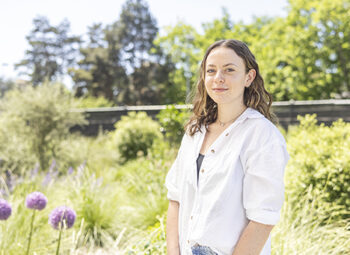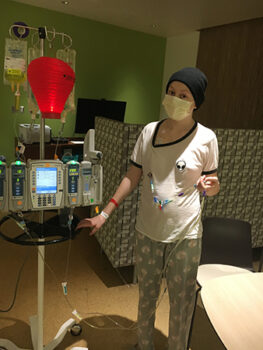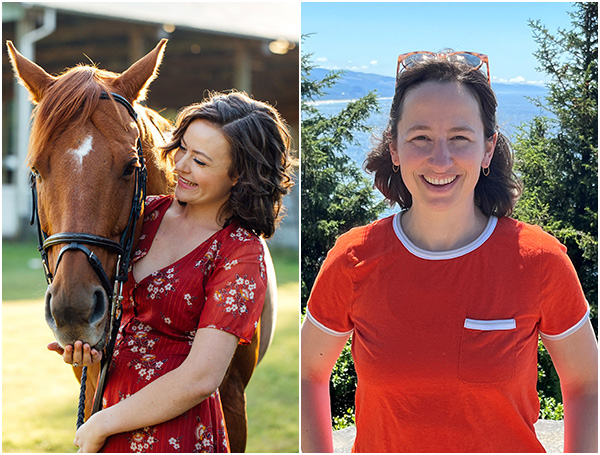 Before she was diagnosed with high-risk acute lymphoblastic lymphoma (ALL), Kinsey was an active 15-year-old who enjoyed competitive horseback riding, spending time with her family and friends, and dreaming about what her future might look like.
Before she was diagnosed with high-risk acute lymphoblastic lymphoma (ALL), Kinsey was an active 15-year-old who enjoyed competitive horseback riding, spending time with her family and friends, and dreaming about what her future might look like.
Less than two months into her cancer treatment at Seattle Children’s, however, Kinsey became a shell of herself. While Kinsey’s cancer was advanced, it was treatable.
Her care team in Seattle Children’s Adolescent and Young Adult (AYA) Cancer Program recommended more than two years of chemotherapy treatment in hopes she would go into full remission.
But ALL sapped Kinsey’s energy and caused severe migraines, and her chemotherapy treatments made her feel nauseous and weak. Her quality of life rapidly declined, and she felt like all sense of normalcy had been stripped from her.
Both Kinsey’s parents and care team were deeply concerned about her mental health. They brought in Dr. Joanna Patten, then an attending psychologist in the Seattle Children’s Cancer and Blood Disorders Center (CBDC), to help.
“Cancer treatment can have profound impacts on AYA patients, not just physically but cognitively, emotionally, developmentally and spiritually,” Dr. Patten, now clinical director of Cancer Care Psychosocial Services, explained. “It can affect their ability to go to school or a movie, hang out with friends, eat a normal meal, date, learn to drive a car and much more. It is not unusual for these patients to sometimes want to end their treatment prematurely — not because they want their lives to be over, but because they want their treatment-related suffering to be over.”
As her feelings of hopelessness grew, Kinsey began to disconnect from reality — numbing her true feelings and hiding them from her family and care team. But she couldn’t hide her anxiety, which often caused her to have panic attacks during her chemotherapy infusions.
Regaining control
At first, Dr. Patten accompanied Kinsey during her infusions, helping her through mindfulness activities like guided meditations and breathing techniques, as well as thought-reframing strategies.
Slowly, Kinsey regained her ability to navigate her fears and endure her treatments, equipped with a coping plan if she began feeling too overwhelmed. Over time, as she became more comfortable with vulnerability, Kinsey began to share other feelings she was having with Joanna in regular therapy sessions.
 “I realized I just needed to talk to someone about the things that were weighing on me,” Kinsey, now 22, shared. “I’m grateful that Joanna allowed me to do that at my own pace and always validated my feelings along the way.”
“I realized I just needed to talk to someone about the things that were weighing on me,” Kinsey, now 22, shared. “I’m grateful that Joanna allowed me to do that at my own pace and always validated my feelings along the way.”
Individual mental health therapy is one of many psychosocial services available to AYA Cancer Program patients, in addition to support from Social Work, Child Life, Creative Arts and Spiritual Care.
The program also holds weekly virtual group therapy sessions where Washington high schoolers and young adults living with cancer, as well as those in remission, can meet, share their stories and support each other.
“Most of our patients with cancer have never met another person their age who has cancer, so their experience feels unique to them and can perpetuate a feeling of profound isolation,” Dr. Patten said. “Our psychosocial team helps facilitate connection between AYA patients so they feel less alone, while respecting each patient’s autonomy to decide which psychosocial supports are right for them.”
Celebrating the small things
During her first year of high-intensity chemotherapy treatments, Kinsey spent 40 days inpatient and countless hours each week receiving outpatient treatment at the CBDC. Throughout that year, Kinsey had limited exposure to friends, family and others in her hometown of Sammamish due to the treatment’s severe physical side effects and her compromised immune system.
One year after she was diagnosed, however, 16-year-old Kinsey transitioned to lower-intensity chemotherapy treatments — a change that prompted reintegration back into school and teenage life. With the help of Joanna and the rest of her care team, Kinsey began to celebrate tiny victories — like being strong enough to walk around her local grocery store, using a new coping skill or when her hair began to grow back.
“My care team took such wonderful care of me and became my biggest cheerleaders,” Kinsey explained. “They lifted me up through my darkest days, and I am forever grateful.”
Following in her footsteps
For years, surviving cancer was the biggest dream Kinsey felt she could have. By the time her chemotherapy treatments ended when she was nearly 18 years old, Kinsey learned she was capable of so much more. She began having big dreams about her future once again.
Her cancer was in remission, and she was thinking about college. After meeting other patients across the state through the AYA Cancer Program and on social media, Kinsey realized not everyone had access to the same mental health care she had — nor did they have a Dr. Patten of their own to help guide them. Her passion for mental health care grew, and it became her next big dream.
“I am extremely proud of Kinsey for working so hard to build resilience and find a career path she feels motivated and inspired by,” Dr. Patten shared. “It’s really powerful and gratifying as a therapist to see her find joy and meaning in her life.”

Kinsey set upon a new journey of helping other kids find hope when they felt hopeless. She went on to earn her bachelor’s degree in psychology and joined Seattle Children’s Psychiatry and Behavioral Medicine Unit as a pediatric mental health specialist. In July, Kinsey then marked her seven-year cancer diagnosis anniversary and started down a new path: graduate school at Palo Alto University.
“After I was diagnosed, I felt the remainder of my life would have an inescapable dark cloud looming around. Slowly, I started to see little buds of happiness popping up. Some days would be rainier than others, but eventually I looked back to see that years had passed and I was living a life I once dreamt of. I know the rain still must come, but it makes me appreciate the flowers so much more.”
One out of every five kids has a mental health disorder that significantly affects their life, and currently only about half of those kids get treatment.
Seattle Children’s has convened a coalition, Generation REACH, to reimagine pediatric mental health care so that all children, teens and families can live their healthiest and most fulfilling lives possible.

